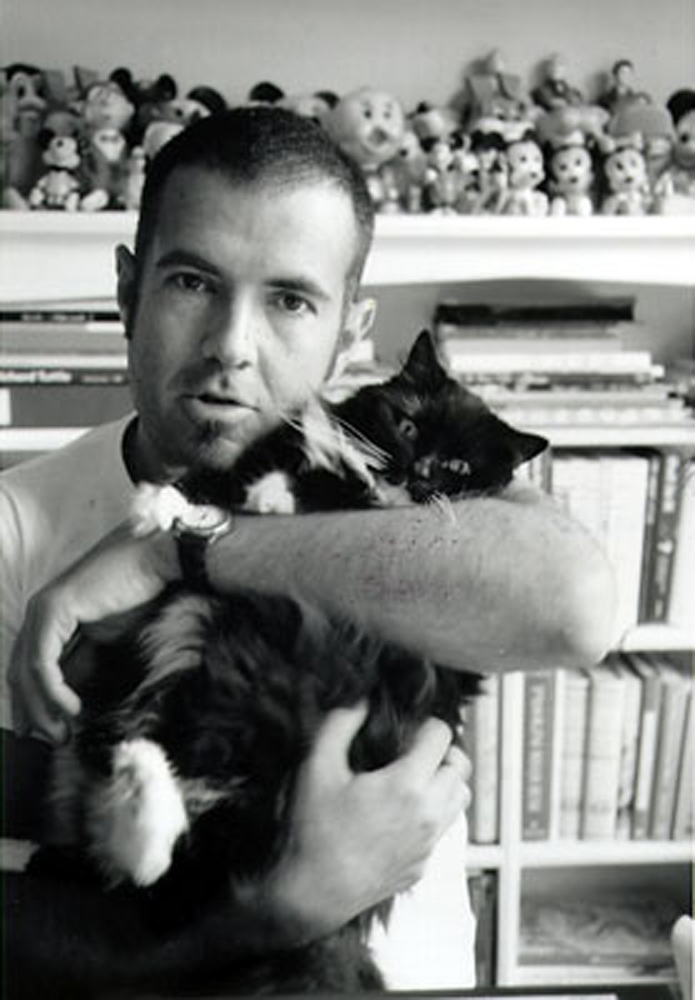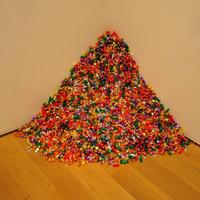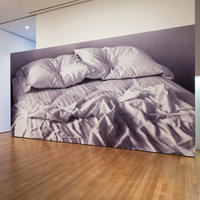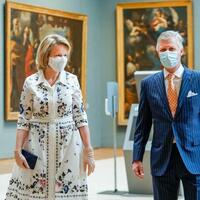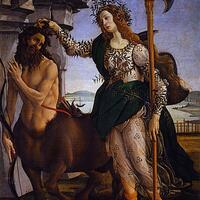More about Félix González-Torres
- All
- Info
- Shop
Works by Félix González-Torres

Contributor
Twenty-three years since his last breath on earth, Felix Gonzalez-Torres is one of the most influential artists and art theorists today.
He synthesized a vast and unique number of influences, political, philosophical and aesthetic, including Marx and Engels, the Marxist playwright Bertolt Brecht, and the artists Carl Andre, Robert Ryman, and Jeff Koons.
Félix González Torres was born in 1957 in Guáimaro, Cuba. His parents sent him to an orphanage in Madrid where he stayed with his sister until going to live with an aunt and uncle in Puerto Rico in 1971. He was in Puerto Rico until 1979, when he moved to New York. The initial purpose of his migration to the U.S. was to study interior design at Pratt Institute, and, indeed, the majority of his installations are meditations on aspects of interior design, like Warhol's Silver Clouds. However, he would tell his interviewer that, "Pratt Institute is the most banal, empty-minded, crass place you could think of...Spend your money on a car but don’t waste it on Pratt."
Hearing words like those, you might figure González Torres for an anti-intellectual person, but this was not at all true. It's more appropriate to say that he often found influences and ideas by taking his own interpretations of theories of art and society into the world, into flea markets, for example, and that he often felt out of place in the straight white male environments of academia. In fact, he would emphasize, "the importance of reading '[Walter] Benjamin, Fanon, Althusser, Barthes, Foucault, Borges, Mattelart and others.'"
His approach was so effective that he was one of the few artists whose work I remember from childhood: his unique installation “Untitled” (Portrait of Ross in L.A.), a tribute to his late, beloved partner Ross Laycock, gave our third-grade class the opportunity to take home pieces of candy, and to re-evaluate our ideas of the limits and meanings of art. It made us part of his artwork, and that was a powerful feeling.
"How can you be feeling if you’re not in love?" he asked. "You need that space, you need that lifting up, you need that traveling in your mind that love brings, transgressing the limits of your body and your imagination. Total transgression."
Sources
- Bleckner, Ross. "Felix Gonzalez-Torres by Ross Bleckner." Bomb, Apr 1, 1995, https://bombmagazine.org/articles/felix-gonzalez-torres/.
- Bourriaud, Nicolas. Esthétique Relationelle. Dijon, France: Presses du réel, 1998.
- Cherry, Deborah. "Sweet Memories: encountering the candy spills of Felix Gonzalez-Torres." Transnational correspondence, special issue of Arte e Ensaios/Arts and Essays (2007): 96-109.
- "Floating a Boulder: Works by Felix Gonzalez-Torres and Jim Hodges," The FLAG Art Foundation, Jan 31, 2010, https://web.archive.org/web/20111008032032/http://www.flagartfoundation…
- Güner, Fisun. "Felix Gonzalez-Torres: playfully teasing, deadly serious." The Guardian, May 18, 2016, https://amp.theguardian.com/artanddesign/2016/may/18/felix-gonzalez-tor….
- McNamara, Andrew. "Illegible Echoes: Felix Gonzalez-Torres, the artist-spy." Image [&] Narrative [e-journal] 22 (2008). http://www.imageandnarrative.be/autofiction2/mcnamara.htm.
- Mosquera, Gerardo. "Remember My Name." In Felix Gonzalez-Torres, edited by Julie Ault. New York: SteidlDangin, 2006: 204-207.
- Rollins, Tim. "Felix Gonzalez-Torres, (interview)." In Between Artists: Twelve contemporary American artists interview twelve contemporary American artists. Edited by Lucinda Barnes, Miyoshi Barosh, William S. Bartman, and Rodney Sappington. Los Angeles:
Featured Content
Here is what Wikipedia says about Félix González-Torres
Félix González-Torres or Felix Gonzalez-Torres (November 26, 1957 – January 9, 1996) was a Cuban-born American visual artist. He lived and worked primarily in New York City between 1979 and 1995 after attending university in Puerto Rico. González-Torres’s practice incorporates a minimalist visual vocabulary and certain artworks that are composed of everyday materials such as strings of light bulbs, paired wall clocks, stacks of paper, and individually wrapped candies. González-Torres is known for having made significant contributions to the field of conceptual art in the 1980s and 1990s. His practice continues to influence and be influenced by present-day cultural discourses. González-Torres died in Miami in 1996 from AIDS-related illness.
Check out the full Wikipedia article about Félix González-Torres

